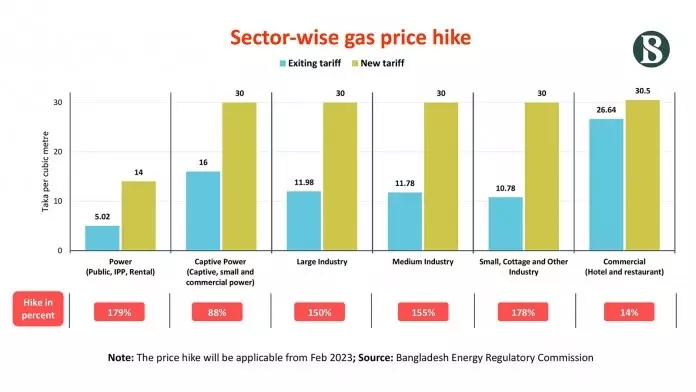Dhaka January 19 2023: Just a few days after increasing electricity prices, the government hiked gas prices for power, industries, and commercial (hotel and restaurant) sectors up to 179%.
The government, for the second time in less than a week, used its newly-granted power (which allows it to set all kinds of energy prices bypassing the regulator’s jurisdictions at any time) to hike gas prices without any public hearing. Earlier on 12 January, the government had announced a 5% increase in electricity prices to Tk7.48 per kilowatt hour at the retail level.
Bangladesh and the IMF reached a staff-level agreement in November last under the Extended Credit Facility, Extended Fund Facility, and the IMF’s new Resilience and Sustainability Facility (RSF), to support the authorities’ home-grown reform agenda.
IMF focused on the key elements of this program, including the long-standing challenges of raising tax revenues, and building a more efficient financial sector. Reforms in these areas, combined with measures to facilitate private investments and export diversification will help create conditions to make Bangladesh’s economy more resilient and support long-term, inclusive and sustainable growth.
The IMF Executive Board is expected to consider approving the program with Bangladesh on January 30.
With the latest development, the price of gas used for power generation has been increased from current Tk5.02 to Tk14 (179% jump) per cubic metre. Also, the gas price for captive power plants raised to Tk30 from Tk16 (88% jump). For large industries, the price is going up to Tk30 from Tk11.98 (150% jump).
For medium industries, the new price has been set at Tk30 from Tk11.78 (155% jump). And for hotels, restaurants, and other commercial entities, the new gas price has been hiked to Tk30.50 from the existing Tk26.64 per cubic metre (14%).
The new prices will be effective from 1 February, said a gazette notification issued by the Ministry of Power, Energy and Mineral Resources on Wednesday (18 January).
However, gas prices for residential, fertiliser, and tea production were not increased.
In June last year, Bangladesh Energy Regulatory Commission (BERC) raised the average price of gas by 22.78% for retail consumers.
Meanwhile, some industrialists said that the gas tariff hike could harm Bangladesh’s business competitiveness. While some are willing to pay more for uninterrupted gas supply, others argue that the industry will not survive if prices are raised without also addressing the ongoing gas crunch.
Mohammad Hatem, executive president of the Bangladesh Knitwear Manufacturers and Exporters Association, said they have recently written to the government and are willing to pay additional rates if the gas supply is uninterrupted.
“But if the current situation does not improve, then the industry will not be able to survive,” he told The Business Standard recently.











